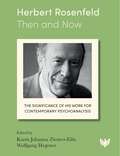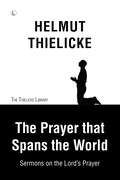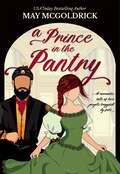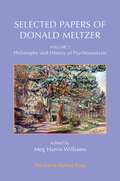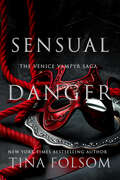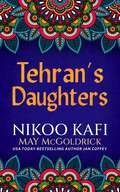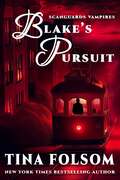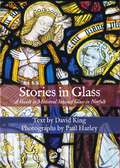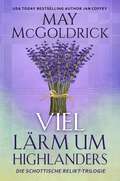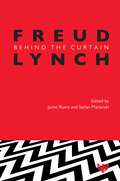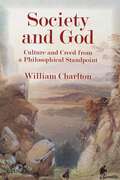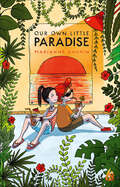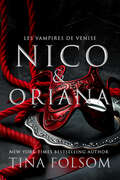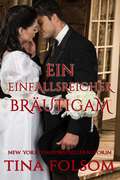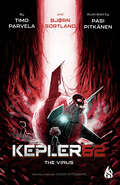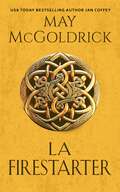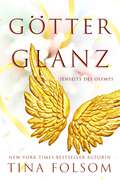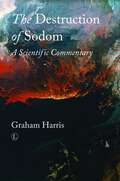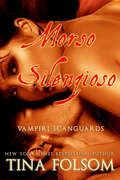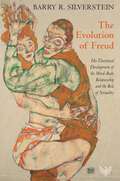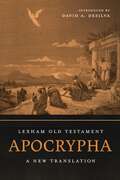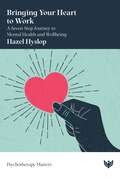- Table View
- List View
Herbert Rosenfeld - Then and Now: The Significance of His Work for Contemporary Psychoanalysis
by Zienert-Eilts, Karin Johanna; Hegener, Wolfgang; Pick, Irma Brenman; Steiner, JohnWith contributions from Hermann Beland, Franco De Masi, Hans-Jurgen Eilts, Claudia Frank, With contributions from Hermann Beland, Irma Brenman Pick, Franco De Masi, Hans-Jurgen Eilts, Claudia Frank, Angela Goyena, Carolin Haas, Wolfgang Hegener, Angela Rosenfeld, John Steiner, Riccardo Steiner, Nils F. Topfer, Klaus Wilde, and Karin Johanna Zienert-Eilts. This collection presents new insights into the life and work of Herbert Rosenfeld and his continuing influence on psychoanalytic theory and practice. It includes accounts from both personal and professional perspectives and is illustrated with 55 black and white images. Part I looks at historical perspectives and includes Karin Johanna Zienert-Eilts' excellent biography of Rosenfeld, Angela Rosenfeld's personal view of her father, Ronald Britton's discussion of the distinction between "defensive" and "destructive" narcissism, and Claudia Frank's look at the iconic figures of Kleinian thought. Part II shines a light on Rosenfeld's extensive supervisory work with a highly personal account from Riccardo Steiner about experience in Italy, Klaus Wilde on Rosenfeld's significance for German psychoanalysts, and reminiscences and afterthoughts from Angela Goyena. In the descriptions of his clinical work in Part III, Franco De Masi, Hans-Jurgen Eilts, Carolin Haas, and Nils F. Topfer demonstrate how Rosenfeld's theoretical discoveries - especially his concept of destructive narcissism - and his related clinical and technical recommendations not only continue to facilitate psychoanalytic work with difficult patients today, but also made this work possible in the first place. The final part of the book examines the sociopolitical applications of Herbert Rosenfeld's concept of destructive narcissism. It begins with a significant paper from Herbert Rosenfeld: Applying my theory of psychosis to the Nazi phenomenon. This is followed by an interview of Rosenfeld by Hermann Beland and two chapters from the editors. Wolfgang Hegener examines how Herbert Rosenfeld can help us to understand Nazi perpetrators, with a particular focus on Adolf Eichmann, and Karin Johanna Zienert-Eilts takes the lens of destructive narcissism to destructive populism to cast new light on the phenomenon. Rounded out by a bibliography of Herbert Rosenfeld's most important writings, an extensive appendix of documents, photographs and three previously unpublished letters which are of historical significance, and prefaces from Irma Brenman Pick and John Steiner, this volume is a must-read for clinicians, academics, and trainees.
Lover Uncloaked (Stealth Guardians)
by Tina FolsomAble to render themselves invisible, immortal Stealth Guardians like Aiden have been protecting humans from the dark power of the Demons of Fear for centuries. But the demons might soon have a powerful tool in their hands to seduce humans to the dark side. The person to provide them with this elixir is the human scientist Leila. Unbeknownst to her, the drug she's developing to cure Alzheimer's Disease has the unexpected side effect of weakening the mind's resistance to the influence of demons. As Aiden accepts the assignment to protect Leila, forbidden desire flares between them, and they are forced to rely on the only people they can trust: each other. But even if he can save her from the demons, a union between them might be the most dangerous undertaking of all. Scanguards Vampires Series: Book 1: Samson's Lovely Mortal Book 2: Amaury's Hellion Book 3: Gabriel's Mate Book 4: Yvette's Haven Book 5: Zane's Redemption Book 6: Quinn's Undying Rose Book 7: Oliver's Hunger Book 8: Thomas's Choice Book 8 1/2: Silent Bite (A Scanguards Wedding) Book 9: Cain's Identity Book 10: Luther's Return Novella: Mortal Wish Book 11: Blake's Pursuit (coming in 2016) Venice Vampyr Novella Series: Venice Vampyr (#1) Venice Vampyr (#2): Final Affair Venice Vampyr (#3): Sinful Treasure Venice Vampyr (#4): Sensual Danger Out of Olympus Series (A romantic comedy series about Greek Gods): Book 1: A Touch of Greek Book 2: A Scent of Greek Book 3: A Taste of Greek Book 4: A Hush of Greek (coming in 2016) Eternal Bachelors Club (contemporary romance): Lawful Escort Lawful Lover Lawful Wife One Foolish Night One Long Embrace One Sizzling Touch
The Prayer that Spans the World: Sermons on the Lord's Prayer (Thielicke Library)
by Helmut Thielicke'The Lord's Prayer can be spoken at the cradle or the grave. It can rise from the altars of great cathedrals and from the dark hovels of those who eat their bread with tears. It can be prayed at weddings and on the gallows. All seven colours of our life are contained in it, and so there is never a time when we are left alone.' In these sermons delivered in the shattered city of Stuttgart during the last days of the war, Helmut Thielicke examined the Lord's Prayer phrase by phrase, drawing from it both immediate comfort and inspiration for the future. As he expounded upon the inner meaning of the familiar phrases, he enabled his despairing congregation to share in this promise of hope - to see the world in a new way, through prayer. Today, for those who are prepared to listen, his words still carry the same power.
A Prince in the Pantry: A REGENCY NOVELLA
by Jan Coffey May McGoldrickPrince Timour Mirza, an heir to the Persian throne, is visiting England on a diplomatic mission to choose a wife. Brought up in a world where his every move is dictated, Timour longs for one night of freedom. Pearl Smith was raised amid London's ton, but a reversal of fortune has left her father languishing in debtors' prison. Now, on the night of the grand ball, she has been reduced to working below stairs at the Whitwell House in London's fashionable West End, the unwitting victim of a former friend's venomous envy. Curious about the life of everyday people, Timour trades his clothes and his position with a companion and escapes the masquerade ball. With the absence of his royal regalia, his darker skin and his beliefs draw unwanted attention. Stunned and humiliated by women she thought were her friends, Pearl flees the mansion. But the last thing she expects is to become the champion of a tall, dark stranger. And in the hours that follow, as a full moon bathes London in a May glow, Pearl and Timour will find that love can come when it's least expected.
Zenon Vantini: From Grand Tour to Package Holiday
by Pamela SambrookIn this remarkable study, Pamela Sambrook rescues from obscurity the contribution of a former member of Napoleon's Imperial Guard to the development of specialist hotels and catering in the formative years of the railway network in England and France. In doing so, she interrogates what lies behind some of Zenon Vantini's very real achievements, legacies and disasters. She asks how far he was driven by his familial background in Elba and his involvement in the political turmoil of early-nineteenth-century France, and to what extent his whole life was known to those around him. Vantini's extraordinary life encapsulates the change between two very different worlds - the old imperial past and the new age of entrepreneurial risk-taking. Never shaking off his old political loyalties, he believed resolutely that the mobility afforded by railway travel would change Europe fundamentally. In the long view he was a component part in the very early years of an industry which revolutionised England and Europe more than did even his hero, Napoleon.
Selected Papers of Donald Meltzer - Vol. 2: Philosophy and History of Psychoanalysis
by Donald MeltzerThe contents of the three volumes are grouped not chronologically but under the headings of 'Personality and Family Structure', 'Philosophy and History of Psychoanalysis', and 'The Psychoanalytic Process and the Analyst'. Together they present his interpretation of the 'Kleinian development' from Freud, through Abraham and Klein, to Bion and the post-Kleinian model; and within this evolution, his view of the natural history of the psychoanalytic process, the aesthetics of the method, and his insights into the operation of the transference and countertransference. Meltzer saw the psychoanalytic process as a new method that contributes alongside more traditional art-forms to our scientific knowledge of the mind. Working with both adults and children, he viewed psychoanalysis in developmental rather than narrowly therapeutic terms, with potential for both analyst and analysand. All his theories derived from clinical work, above all from dream-reading and children's phantasy play; and owing to his extensive international teaching experience, his own material was enriched by that of many supervisees. This collection of papers, read as a whole, invites new readers to follow and partake in what he called 'the most interesting conversation in the world'.
Sensual Danger (Venice Vampyr)
by Tina FolsomEarly 1800s – Venice, Italy. Where ancient stones whisper secrets and the shadows conceal immortal desires. For the enigmatic vampire Nico, acquiring a strategic foothold in the city means a swift, convenient marriage – a means to an end in his brethren's quest for a secure Venetian compound. His plan is simple: a wedding night formality, followed by his new bride's swift departure, leaving him free to indulge in his libertine existence. But fate, with a wicked twist, delivers Oriana. Her beauty is a shock, her spirit untamed. The moment Nico lays eyes on her, his carefully laid plans shatter like Venetian glass. Yet, Oriana harbors ambitions far beyond the confines of wifely obedience. Her passion lies in the pursuit of scientific discovery, a world of intellect and innovation that clashes with the expectations of her new, powerful husband. As their reluctant union unfolds, Nico uncovers a truth far more perilous than Oriana's independent nature. His headstrong bride guards secrets that could unravel not only his immortal existence but the entire vampire society of Venice. Torn between duty and a burgeoning desire, Nico faces a deadly choice: eliminate the threat his wife unknowingly poses, or succumb to the intoxicating challenge of seduction. Luckily for Nico, the art of persuasion, the dance of desire, is his most exquisite skill. He will unravel Oriana's secrets, one stolen kiss, one lingering touch at a time. He will entice her to his side, blurring the lines between captive and captor, between animosity and an all-consuming passion that could either save them both… or lead to their ultimate destruction. Prepare to be swept away by a tide of forbidden attraction and hidden agendas, where the clash of intellect and immortal desire ignites a fire that could consume Venice itself. The Venice Vampyr Novella Saga: Venice Vampyr (#1): Wicked Lover Venice Vampyr (#2): Final Affair Venice Vampyr (#3): Sinful Treasure Venice Vampyr (#4): Sensual Danger Out of Olympus Book 1: A Touch of Greek Book 2: A Scent of Greek Book 3: A Taste of Greek Book 4: A Hush of Greek Scanguards Vampires Book 1: Samson's Lovely Mortal Book 2: Amaury's Hellion Book 3: Gabriel's Mate Book 4: Yvette's Haven Book 5: Zane's Redemption Book 6: Quinn's Undying Rose Book 7: Oliver's Hunger Book 8: Thomas's Choice Book 8 1/2: Silent Bite Book 9: Cain's Identity Book 10: Luther's Return Novella: Mortal Wish Book 11: Blake's Pursuit Novella 11 1/2: Fateful Reunion Book 12: John's Yearning Book 13: Ryder's Storm Book 14: Damian's Conquest Book 15: Grayson's Challenge Book 16: Isabelle's Forbidden Love Book 17: Cooper's Passion Book 18: Vanessa's Bravery Book 19: Patrick's Seduction Thriller (as T.R. Folsom) Eyewitness Stealth Guardians Lover Uncloaked (#1) Master Unchained (#2) Warrior Unraveled (#3) Guardian Undone (#4) Immortal Unveiled (#5) Protector Unmatched (#6) Demon Unleashed (#7) Code Name Stargate Ace on the Run (#1) Fox in plain Sight (#2) Yankee in the Wind (#3) Tiger on the Prowl (#4) Hawk on the Hunt (#5) The Hamptons Bachelor Club Teasing Enticing Beguiling Scorching Alluring Sizzling Time Quest Book 1 - Reversal of Fate Book 2 - Harbinger of Destiny
Tehran's Daughters
by Jan Coffey May McGoldrick Nikoo KafiTwo women. Two revolutions. A lifetime of exile and longing. In 1978, seventeen-year-old Omid is forced to flee Iran on the eve of the Islamic Revolution, leaving behind a mother whose defiance against the regime has made her a marked woman. Arriving in America, Omid believes her stay will be temporary. But when her mother is declared a fugitive, her dreams of return collapse, and she is left to build a life in exile—one shaped by loss, resilience, and the echoes of a past she cannot escape. Three decades later, Omid is a mother raising her daughters in Connecticut, trying to bury the memories of the country she once called home. But when her eldest daughter, Sayeh, is arrested in Tehran amid a new wave of protests, Omid's past and present collide. As Sayeh disappears into the underground resistance, Omid is thrust into the same fear and defiance that once defined her own youth. Spanning two generations of women bound by revolution and exile, Tehran's Daughters is a powerful story of resistance, identity, and the unbreakable ties between mothers and daughters. Echoes of Resistance The Price of Freedom Previously published as Omid's Shadow
Blake's Pursuit (Scanguards Vampires)
by Tina FolsomWhen their mutual friend Hannah vanishes without a trace, Blake Bond, vampire and chief of hybrid security at Scanguards, finds himself unwillingly allied with Lilo Schroeder, a human thriller author. As they race to unravel the mystery of Hannah's disappearance, they stumble upon a chilling plot by rogue vampires—a conspiracy that threatens to ignite a war and obliterate all human life. Thrust into a world of shadow and peril, Blake and Lilo must outwit their ruthless enemies at every turn. But the danger isn't just external. A sizzling, undeniable attraction burns between them, a forbidden current that threatens to derail their mission. Lilo's courage is unwavering in the face of monsters, but what will happen when Blake is forced to reveal his true, vampiric nature? Will their growing passion be enough to overcome the ultimate secret that divides them? Scanguards Vampires: Book 1: Samson's Lovely Mortal Book 2: Amaury's Hellion Book 3: Gabriel's Mate Book 4: Yvette's Haven Book 5: Zane's Redemption Book 6: Quinn's Undying Rose Book 7: Oliver's Hunger Book 8: Thomas's Choice Book 8 1/2: Silent Bite (A Scanguards Wedding Novella) Book 9: Cain's Identity Book 10: Luther's Return Novella: Mortal Wish Book 11: Blake's Pursuit
Stories in Glass: A Guide to Medieval Stained Glass in Norfolk
by David King Paul HarleyNorfolk's churches are home to some of the highest-quality and best-preserved medieval stained glass in Britain. Panels produced in the county's extensive and long-lasting workshops, centred in the historically important city of Norwich, can be found in some 270 buildings, including churches, museums and country houses. Moreover, recent research has revealed for the first time the original location of many of the panels now dispersed around the county. In Stories in Glass, Paul Harley and David King reveal these treasures to a new audience. Harley's exquisite photographs are set alongside historical and artistic explanations that illuminate the social, economic and religious background to the windows we see today. With 200 colour images, and maps showing the locations of the windows discussed, this beautifully illustrated guide will appeal to the explorer and collector alike.
Viel Lärm um Highlanders (Die Schottische Relikt-Trilogie)
by Jan Coffey May McGoldrickIm Herzen Schottlands trifft ein Hochland-Krieger auf einen ebenbürtigen Gegner... In einem Land, in dem Magie die uralten Steine durchwebt und das Geflüster legendärer Kreaturen in den nebligen Schluchten widerhallt, steht Alexander Macpherson, ein furchterregender Highlander, vor seiner bisher größten Herausforderung. Er hat die Spur seiner zauberhaften Frau verloren. Als er sich bereit erklärte, die feurige Kenna Mackay zur Frau zu nehmen, um die Herrschaft seines Clans im Norden zu festigen, rechnete er mit einer Zeit der Anpassung. Was er nicht voraussah, war, dass die temperamentvolle Schönheit in der Hochzeitsnacht die Flucht ergriff und eine Spur von Geheimnissen und Sehnsucht hinterließ. Kenna Mackay glaubte, in den heiligen Mauern einer Priorei sicher zu sein und ihre Fähigkeiten in den mystischen Künsten des Heilens zu verbessern. Doch das Schicksal hat andere Pläne. Als sie von ihrem eigenen Ehemann entführt wird, findet sie sich in einer Welt wieder, in der die Funken fliegen und die Geister aufeinanderprallen. Als ihr leidenschaftlicher Willenskampf wieder aufflammt, entflammt auch eine Liebe, die so tief und wild ist wie die Hochlandseen. Doch dann tauchen Schatten aus Kennas Vergangenheit auf, die ein tödliches Geheimnis mit sich bringen, das ihre aufkeimende Romanze zu zerstören droht. Während ein herzloser Bösewicht immer näher rückt, müssen Alexander und Kenna die Kraft aufbringen, sich ihren dunkelsten Ängsten zu stellen. Gemeinsam müssen sie die Macht der unsterblichen Liebe nutzen, um die Mächte zu besiegen, die versuchen, sie auseinander zu reißen. Dieses Mal ist Alexander fest entschlossen: Er wird seine magische Braut nicht noch einmal verlieren.
Freud/Lynch: Behind the Curtain
by Jamie Ruers and Stefan MarianskiThe films of David Lynch are sometimes said to be unintelligible. They confront us with strange dreamscapes populated with bizarre characters, obscure symbols and an infuriating lack of narrative consistency. Yet despite their opacity, they hold us transfixed. Lynch, who once told an interviewer, "I love dream logic," would surely agree with Sigmund Freud's famous claim that "before the problem of the creative artist, psychoanalysis must lay down its arms." But what else might the two agree on? Rather than presuming to fill in what Lynch leaves open by positing some forbidden psychosexual reality lurking behind his trademark red curtains, this book instead maintains a fidelity to the mysteries of his wonderful and strange filmic worlds, finding in them productive spaces where thought and imagination can be set to work. With contributions from scholars, psychoanalysts, cinephiles, and filmmakers, this collection of essays explores potential affinities and disjunctions between Lynch and Freud. Encompassing themes such as art, identity, architecture, fantasy, dreams, hysteria and the unconscious, Freud/Lynch takes as its point of departure the possibility that the enterprise in which these two distinct investigators are engaged might in some sense be a shared one.
Society and God
by William Charlton“Where should God be in thinking about society, or society in thinking about God? This book shows how philosophy can help non-philosophers with these questions. It shows that intelligence is the product, not the source, of society and language, and the rationality of individuals is inevitably conditioned by the distinctive customs and beliefs of their societies. Addressing the idea that religion can impede the smooth running of society, it argues that the Western concept of religion is taken from Christianity and cannot usefully be extended to non-European cultures. But any society will be threatened by a sub-society with customs conflicting with those of the whole in which it exists, and Jews, Christians and Muslims have sometimes formed such sub-societies. Charlton proceeds to consider how our dependence upon society fits with traditional beliefs about creation, salvation and life after death, and offers a synthesis that is new without being unorthodox. He indicates where Christian customs concerning birth, death, sex and education conflict with those of secular liberalism and considers which culture, Christian or secular liberal, has the better chance of prevailing in a globalised world.”
Our Own Little Paradise
by Marianne Kaurinna has no plans for the summer. Suddenly, she finds herself lying in front of the entire class, telling them she is going to the Mediterranean for three weeks. And then the lie keeps growing and growing via social media. The only problem is that the new boy in class has moved to Ina's neighborhood and he will easily find out that she is not in the Mediterranean. Perhaps the best summer holiday is the one you thought would be the worst? A warm, believable story about friendship, first love, and social media from Norwegian author Marianne Kaurin.
Nico & Oriana (Les Vampires de Venise)
by Tina FolsomDébut des années 1800, à Venise, en Italie. Là où les pierres anciennes murmurent des secrets et où les ombres dissimulent des désirs immortels. Pour Nico, un vampire énigmatique, acquérir une position stratégique dans la ville signifie un mariage rapide et opportun, et donc un moyen d'atteindre la quête fraternelle : trouver un refuge sûr à Venise. Son plan est simple : une nuit de noces pour la forme, suivie du départ rapide de sa nouvelle épouse, qui lui laissera toute liberté pour se livrer à sa vie libertine. Mais le destin, avec un cruel rebondissement, lui envoie Oriana. Sa beauté est un choc, son esprit indomptable. Dès que Nico pose les yeux sur elle, ses plans soigneusement élaborés volent en éclats comme du verre vénitien. Pourtant, Oriana nourrit des ambitions qui dépassent largement les limites de l'obéissance conjugale. Sa passion réside dans la quête de découvertes scientifiques, un monde d'intelligence et d'innovation qui contraste avec les attentes de son nouveau mari puissant. Au fur et à mesure que leur union peu enthousiaste se développe, Nico découvre une vérité bien plus dangereuse que la nature indépendante d'Oriana. Sa femme obstinée cache des secrets qui pourraient non seulement mettre fin à son existence immortelle, mais aussi détruire toute la société vampire de Venise. Tiraillé entre son devoir et un désir naissant, Nico doit faire un choix mortel : éliminer la menace que sa femme représente à son insu, ou succomber au défi enivrant de la séduction. Heureusement pour Nico, l'art de la persuasion, la danse du désir, est son talent le plus exquis. Il découvrira les secrets d'Oriana d'un baiser volé, une caresse langoureuse à la fois. Il l'attirera à ses côtés, brouillant les frontières entre captive et ravisseur, entre animosité et passion dévorante, ce qui pourrait soit les sauver tous les deux… soit les mener à leur perte. Préparez-vous à être emporté par un tourbillon d'attirance interdite et d'intrigues cachées, où le choc entre l'intellect et le désir immortel allume un feu qui pourrait bien consumer Venise elle-même. Les Vampires de Venise Nouvelle 1 : Raphael & Isabella Nouvelle 2 : Dante & Viola Nouvelle 3 : Lorenzo & Bianca Nouvelle 4 : Nico & Oriana Nouvelle 5 : Marcello & Jane Le club des éternels célibataires Tome 1 : L'escort attitrée Tome 2 : L'amante attitrée Tome 3 : L'épouse attitrée Tome 4 : Une folle nuit Tome 5 : Une simple erreur Tome 6 : Une Touche de feu Les Vampires Scanguards La belle mortelle de Samson (#1) La provocatrice d'Amaury (#2) La partenaire de Gabriel (#3) L'enchantement d'Yvette (#4) La rédemption de Zane (#5) L'éternel amour de Quinn (#6) Les désirs d'Oliver (#7) Le choix de Thomas (#8) Discrète morsure (#8 ½) L'identité de Cain (#9) Le retour de Luther (#10) La promesse de Blake (#11) Fatidiques Retrouvailles (#11 ½) L'espoir de John (#12) La tempête de Ryder (#13) La conquête de Damian (#14) Le défi de Grayson (#15) L'amour interdit d'Isabelle (#16) La passion de Cooper (#17) Le courage de Vanessa (#18) La séduction de Patrick (#19) Ardent désir (Nouvelle) Les Gardiens de la Nuit Amant Révélé (#1) Maître Affranchi (#2) Guerrier Bouleversé (#3) Gardien Rebelle (#4) Immortel Dévoilé (#5) Protecteur Sans Égal (#6) Démon Libéré (#7) La série Les Vampires de Venise a tout pour plaire : mariage de convenance, coup de foudre, proximité forcée, malades en phase terminale, vierges, décors romantiques, sauvetage, amour instantané, identité cachée, âmes sœurs, femme en danger, demoiselle en détresse, fraternité, trésor caché, intrigue, trahison, scènes érotiques brûlantes.
Ein einfallsreicher Bräutigam: Western-Kurzgeschichte
by Tina FolsomAls Rancher Irving versucht, einen geeigneten Ehemann für seine widerwillige Tochter Ellen zu finden, indem er eine Menge Geld bietet, nimmt sie die Sache selbst in die Hand und plant zu fliehen. Doch ein vermeintlicher Cowboy vereitelt ihren Plan und entführt sie stattdessen. James ist jedoch kein Cowboy, sondern ein Rancher auf der Suche nach einer Frau. Und als er Ellen erwischt, nimmt er sie mit auf eine leidenschaftliche und erotische Reise, während der er versucht, ihr beizubringen, dass ein Ehemann doch einen Zweck erfüllen kann. Als Rancher Irving versucht, einen geeigneten Ehemann für seine widerwillige Tochter Ellen zu finden, indem er eine Menge Geld bietet, nimmt sie die Sache selbst in die Hand und plant zu fliehen. Doch ein vermeintlicher Cowboy vereitelt ihren Plan und entführt sie stattdessen. James ist jedoch kein Cowboy, sondern ein Rancher auf der Suche nach einer Frau. Und als er Ellen erwischt, nimmt er sie mit auf eine leidenschaftliche und erotische Reise, während der er versucht, ihr beizubringen, dass ein Ehemann doch einen Zweck erfüllen kann. Jenseits des Olymps: Buch 1 - Ein Grieche für alle Fälle Buch 2 - Ein Grieche zum Heiraten Buch 3 - Ein Grieche im 7. Himmel Buch 4 - Ein Grieche für Immer Der Club der ewigen Junggesellen Buch 1: Begleiterin für eine Nacht Buch 2: Begleiterin für tausend Nächte Buch 3: Begleiterin für alle Zeit Buch 4: Eine unvergessliche Nacht Buch 5: Eine langsame Verführung Buch 6: Eine hemmungslose Berührung Codename Stargate Band 1 - Ace – Auf der Flucht Band 2 - Fox – Unter Feinden Band 3 - Yankee – Untergetaucht (kommt im Frühjahr 2022) Time Quest Band 1 - Umkehr des Schicksals Hüter der Nacht: Buch 1 – Geliebter Unsichtbarer Buch 2 – Entfesselter Bodyguard Buch 3 – Vertrauter Hexer Buch 4 – Verbotener Beschützer Buch 5 – Verlockender Unsterblicher Buch 6 – Übersinnlicher Retter Buch 7 – Unwiderstehlicher Dämon Scanguards Vampire: Buch 1 - Samsons Sterbliche Geliebte Buch 2 - Amaurys Hitzköpfige Rebellin Buch 3 - Gabriels Gefährtin Buch 4 - Yvettes Verzauberung Buch 5 - Zanes Erlösung Buch 6 - Quinns Unendliche Liebe Buch 7 - Olivers Versuchung Buch 8 - Thomas' Entscheidung Buch 8 1/2 - Ewiger Biss (Eine Scanguards Hochzeits) (Auch als zweisprachiges Taschenbuch erhältlich) Buch 9: Cains Geheimnis Buch 10: Luthers Rückkehr Novelle: Brennender Wunsch Buch 11 – Blakes Versprechen Buch 11 1/2 – Schicksalhafter Bund (Novelle) Buch 12 – Johns Sehnsucht Der Clan der Vampire (Venedig 1 & 2) Der Clan der Vampire (Venedig 3 & 4) Der Clan der Vampire (Venedig 5)
Kepler62 #5 (Kepler62)
by Bjørn Sortland Timo ParvelaIn book 5 of this outer space adventure series, Olivia finally reveals the truth to others, and it's terrifying. Back on earth, computers are gaining power and they're already unstoppable. They're capturing people, their main competition when it comes to energy consumption, and killing them. In order to survive, a viable number of people must escape earth - and Kepler62 is their destination of choice. Unfortunately, the Whisperers are deemed too powerful to exist alongside humans, which means they need to be eliminated before any more people arrive. Joni, who is carrying a virus that shall wipe them out, is chosen to complete the task. But Joni goes into hiding. Meanwhile Ari and Marie also discover that the extra travel capsule on their space craft is now open and empty. Whoever travelled in it is now awake and on Kepler62 . . .
La Firestarter: Trilogía del Tesoro de las Highlands (Trilogía del Tesoro de las Highlands)
by Jan Coffey May McGoldrickTrilogía del Tesoro de las Highlands: Libro 3 ¡Se necesita un pirata para domar a otro! La Trilogía del Tesoro de las Highlands recoge las vidas y los amores de tres hermanas escocesas. Ahora, en la emocionante conclusión, conoce a Adrianne... una mujer sin compromisos ni inhibiciones.... Arrojada a los brazos del hombre que desea más que su corazón, Adrianne Percy estaba escondida en las Islas Occidentales, a salvo de los enemigos de su familia hasta que sus hermanas enviaron a un famoso pirata para que la devolviera a las Highlands. Pero cuando urde un plan para liberar a su madre secuestrada, este plan requiere que se case con el apuesto pícaro. Y lo que comienza como un simple asunto de negocios se convierte rápidamente en un deseo incontrolable...
Götterglanz (Jenseits des Olymps)
by Tina FolsomDer Olymp versinkt im Chaos. Hermes' Herz ist das nächste Opfer. Als Hermes' geflügelte Sandalen –– die Teleportationsquelle der Götter –– von einer Sterblichen gestohlen werden, befindet sich der flinke Götterbote in einem Wettlauf gegen die Zeit, bei dem es um mehr als nur die göttliche Ordnung geht. Die Diebin ist Penelope, eine brillante und bezaubernde Professorin für Griechische Geschichte, deren Faszination für die Antike sie auf einen gefährlichen Weg geführt hat. Während Hermes die faszinierende Sterbliche verfolgt, sprühen ihre Begegnungen vor Witz und unbestreitbarer Anziehungskraft. Doch auch andere begehren die Macht der Sandalen, was ihre Verfolgungsjagd zu einem gefährlichen Spiel macht. Nun muss Hermes nicht nur schlaue Gegner überlisten und seine gestohlenen Artefakte zurückholen, sondern auch sein Herz vor der bezaubernden Penelope schützen, die entschlossen scheint, seine unsterbliche Gelassenheit mit ihren weiblichen Reizen zu unterminieren. Lassen Sie sich mitreißen von dem spannenden dritten Band der "Jenseits des Olymps"-Reihe, einer magischen romantischen Fantasy, in der ein charmanter Gott und eine hochintelligente Sterbliche in ein Abenteuer verwickelt werden, das ihnen beiden das Herz stehlen könnte. Jenseits des Olymps Band 1 – Göttersturm Band 2 - Göttertraum Band 3 - Götterglanz Band 4 – Götterlust Scanguards Vampire Band 1 - Samsons Sterbliche Geliebte Band 2 - Amaurys Hitzköpfige Rebellin Band 3 - Gabriels Gefährtin Band 4 - Yvettes Verzauberung Band 5 - Zanes Erlösung Band 6 - Quinns Unendliche Liebe Band 7 – Olivers Versuchung Band 8 – Thomas' Entscheidung Band 8 1/2 – Ewiger Biss Band 9 – Cains Geheimnis Band 10 – Luthers Rückkehr Band11 – Blakes Versprechen Band 11 1/2 – Schicksalhafter Bund Band 12 – Johns Sehnsucht Band 13 – Ryders Rhapsodie Band 14 - Damians Eroberung Band 15 - Graysons Herausforderung Band 16 - Isabelles verboten Liebe Band 17 - Coopers Leidenschaft Band 18 - Vanessas Wagemut Band 19 - Patricks Verführung Hüter der Nacht Band 1 – Geliebter Unsichtbarer Band 2 – Entfesselter Bodyguard Band 3 – Vertrauter Hexer Band 4 – Verbotener Beschützer Band 5 – Verlockender Unsterblicher Band 6 – Übersinnlicher Retter Band 7 – Unwiderstehlicher Dämon Andere Serien: Der Clan der Vampire Codename Stargate Time Quest Der Club der ewigen Junggesellen Die Jenseits des Olymps Serie hat alles: Hochzeiten, falsche Verlobte, Humor, Unfug, Liebe auf den ersten Blick, blinder Protagonist, erzwungene Nähe, Entführungen, griechische Götter, idyllische Umgebungen, verborgene Identität, Seelenverwandte, Amnesie, Frau in Gefahr, Jungfrau in Not, Brüderband, romantische Komödie, Fisch aus dem Wasser.
Heart of Gold (Macpherson Series)
by Jan Coffey May McGoldrickUSA Today Bestselling Author Winner of the Holt Medallion for Best Historical Romance From the wild shores of the Scotland's Western Isles to the bloody fields of France to the glittering courts of Europe, the Macpherson Series follows a family's fight for Scottish independence against the Tudor king, Henry VIII. RITE OF PASSION At the tournament of two kings, Elizabeth Boleyn has attracted not only the eyes of Henry Tudor, but those of the Scottish warrior, Ambrose Macpherson, whose bold offer might be her only salvation... QUEST OF LOVE Ambrose Macpherson feels attraction for the daughter of the English diplomat. That the hated English king is pursuing her makes Elizabeth an even greater prize. But after witnessing an act of treachery that could topple the crown, Elizabeth has vanished. Ambrose knows that fate will allow him no rest until he finds her…
The Destruction of Sodom: A Scientific Commentary
by Graham J HarrisIn The Destruction of Sodom, the Biblical account of the destruction of Sodom and Gomorrah is examined under the spotlight of modern science against a cultural backdrop of history and archaeology. In this scientific reconstruction, the account of events described in the book of Genesis is verified and it is established that the destruction occurred at about 2350 BC as a result of an earthquake-induced landslide transporting Sodom to the depths of the Dead Sea. Strands of geography, geology, andengineering science are drawn together to provide comprehensive treatment of all relevant scientific aspects pertinent to a rational understanding of the mechanics of the disaster. The detailed scientific argument follows a discussion of the Genesisaccount and considerations of Canaanite culture and commerce, with specific attention to the trade in bitumen. On this point, Graham Harris provides evidence that the mainstay of Canaanite commerce was the exploitation of the bitumen resources of the Dead Sea, that the Sodomites were among the world's first chemical engineers, and from the resources of the region a large number of processed materials also would have been exported to Egypt. The Destruction of Sodom is an example of the application of science to a fuller understanding of one of the most intriguing events of the Old Testament, and will be of direct interest to scholars as well as to the wider public.
Morso Silenzioso: Un matrimonio Scanguards (Libro 8 1/2) (Vampiri Scanguards)
by Tina FolsomIl giovane vampiro Oliver e Ursula, la donna che ha salvato da un bordello del sangue, stanno finalmente per sposarsi. Ma quando i genitori di lei, una coppia cinese dai modi tradizionali, arrivano in città per assistere al matrimonio secondo le usanze, si scatena il caos. Oliver si ritrova costantemente sul punto di rivelare per sbaglio ai futuri suoceri che lui, e tutta la numerosa famiglia allargata della Scanguards, sono vampiri. E mentre confusione e imprevisti si susseguono senza sosta, un misterioso stalker si aggira nell'ombra, deciso a distruggere il legame tra Ursula e Oliver… prima che possano suggellare la loro unione con un legame di sangue. Vampiri Scanguards: Desiderio Mortale (Storia breve #½) La Graziosa Mortale di Samson (#1) L'Indomita di Amaury (#2) L'Anima Gemella di Gabriel (#3) Il Rifugio di Yvette (#4) La Salvezza di Zane (#5) L'Amore Infinito di Quinn (#6) La Fame di Oliver (#7) La Scelta di Thomas (#8) Morso Silenzioso (#8 ½) L'Identità di Cain (#9) Il Ritorno di Luther (#10) La Missione di Blake (#11) Riunione Fatidica (#11 ½) Il Desiderio di John (#12) La Tempesta di Ryder (#13) La Conquista di Damian (#14) La Sfida di Grayson (#15) L'Amore Proibito di Isabelle (#16) La Passione di Cooper (#17) Il Coraggio di Vanessa (#18) La serie Vampiri Scanguards ha tutto: amore a prima vista, nemici che diventano amanti, incontri fortuiti, colpo di fulmine, eroe alfa, compagni predestinati, guardia del corpo, banda di fratelli, damigella in pericolo, donna in pericolo, la bella e la bestia, identità nascosta, anime gemelle, primo amore, vergini, eroe tormentato, divario di età, una seconda possibilità d'amore, amante in lutto, ritorno dalla morte, bambino segreto, playboy, rapimenti, da amici ad amanti, coming out, ammiratore segreto, ultimo a saperlo, amore non corrisposto, amnesia, regalità, amore proibito, gemelli identici, partner nella lotta al crimine.
The Evolution of Freud: His Theoretical Development of the Mind-Body Relationship and the Role of Sexuality
by Barry R SilversteinRenowned Freud scholar Barry R. Silverstein presents in a historical context an overview of the development of Freud's theories. What was Freud thinking, when, and why and what were the major influences which shaped his ideas? We follow the inner movement of his theory construction, its meaning and coherence, as well as his conceptual logic and personal directions concerning his evolving views of the reciprocal interactions between mind and body, the motivational force of instinctual drives, and the dominant role of sexuality rooted in evolutionary biology in human development, behaviour, and the creation of neurotic disturbances. We follow Freud's construction and sequential reconstructions of his theoretical models concerning the nature, dynamics, and principles of unconscious mental functioning, including his changing concepts on the nature and purpose of dreams. We trace his changing views on the role of deferred action of early childhood experiences and the determining role of unconscious fantasy, psychic reality, in the formation of adult character structure and neuroses. Through such historical analysis this book provides grounding for a meaningful understanding of Freud's familiar concepts: id, ego, superego, and the Oedipus complex. We explore what these concepts meant to Freud, why he conceived them, and what functions they served in his theory of mind. This is the perfect book for students and trainees wanting to learn more about the development of Freud's ideas, as well as for established psychoanalysts and psychotherapists interested in expanding their knowledge of Freud's theories.
Lexham Old Testament Apocrypha: A New Translation
by David A. DeSilvaA modern translation with introductions by David A. deSilva. The Lexham Old Testament Apocrypha includes: Tobit (Vaticanus and Sinaiticus) Judith Greek Esther (Greek) Wisdom of Solomon Wisdom of Sirach Baruch Letter of Jeremiah the additions to Daniel (Old Greek and Theodotion), including the Prayer of Azariah, Susanna, and Bel and the Dragon 1–4 Maccabees 1–2 Esdras the Prayer of Manasseh Psalm 151 Psalms of Solomon Greek 1 Enoch Beautifully typeset in a single-column format, the Lexham Old Testament Apocrypha provides a literal and contemporary translation for modern readers. David A. deSilva briefly introduces each book, providing context and insight. This volume includes works typically omitted from other editions of the Apocrypha, such as the Psalms of Solomon, the Greek text of Enoch, and multiple versions of Tobit and the additions to Daniel. The Apocrypha has been highly esteemed throughout history. While its canonical status is disputed, it has been embraced by Christians over centuries for personal study, devotion, and worship. The diverse writings in the Apocrypha contain biblical and post-biblical history, historical fiction, wisdom, and liturgy. These books shed light on Second Temple (intertestamental) Judaism and the New Testament, and they continue to inspire readers today.
Bringing Your Heart to Work: A Seven-Step Journey to Mental Health and Wellbeing
by Hazel HyslopBringing your Heart to Work: A Seven-Step Journey to Mental Health and Wellbeing is based on Hazel Hyslop's experience of working as a mental health specialist locally and globally. It gives an account of her personal experience of burnout and her witnessing of burnout among her colleagues and clients. In her own journey to self-care, Hazel kept journals of her experiences and noticed a pattern in what worked. She started using some of these principles in her work as she began to see a parallel process with many of her clients and colleagues. For example, most of her clients were women, most high achievers, had great careers, but secretly harboured passions that they were not pursuing. The drive to succeed led to increased stress and burnout, as well as questioning their identity and purpose in life. What was becoming clearer with each client was that their story was mirroring her own story. Hazel too had been on the hamster wheel for many years trying to achieve success. She reached a point in her life where she no longer knew who she was. She had become lost, confused, scared. Hazel had no professionals to emulate in her family. Her parents, their parents, and the generations before had completed only basic elementary schooling. Her determination to do well coupled with expectations from others, led her to push herself to get to the top as quickly as she could. She had to beat all odds to become the first one in her family to go to secondary school, to university, to become a professional. As newborns we come into the world as pure beings. However, by the age of seven years, we are influenced by those around us and our beliefs systems are formed. We are programmed for success based on who we are, what we have or what we do, and what others think of us. However, over time, we start to recognise that this is not enough. The more we strive, the more we become dissatisfied. A familiar story from clients is: "I feel lost, I have no purpose, or I feel stuck. I don't know who I am anymore." With the help of Hazel's Seven-Step Journey model, clients are able to facilitate a transformation to help regain purpose and a sense of self. The model uses the metaphor of a journey: the book asks the reader to take a voyage through their lives, offering tools to gain clarity and find better solutions. This journey is illustrated with client stories to demonstrate how the model helped them to transform and to give hope to the reader for their own metamorphosis. At a time when so many are experiencing overwork, overwhelm, and overthinking, Bringing your Heart to Work: A Seven-Step Journey to Mental Health and Wellbeingis the ideal book to quieten the noise and recapture you are and who you want to be.
